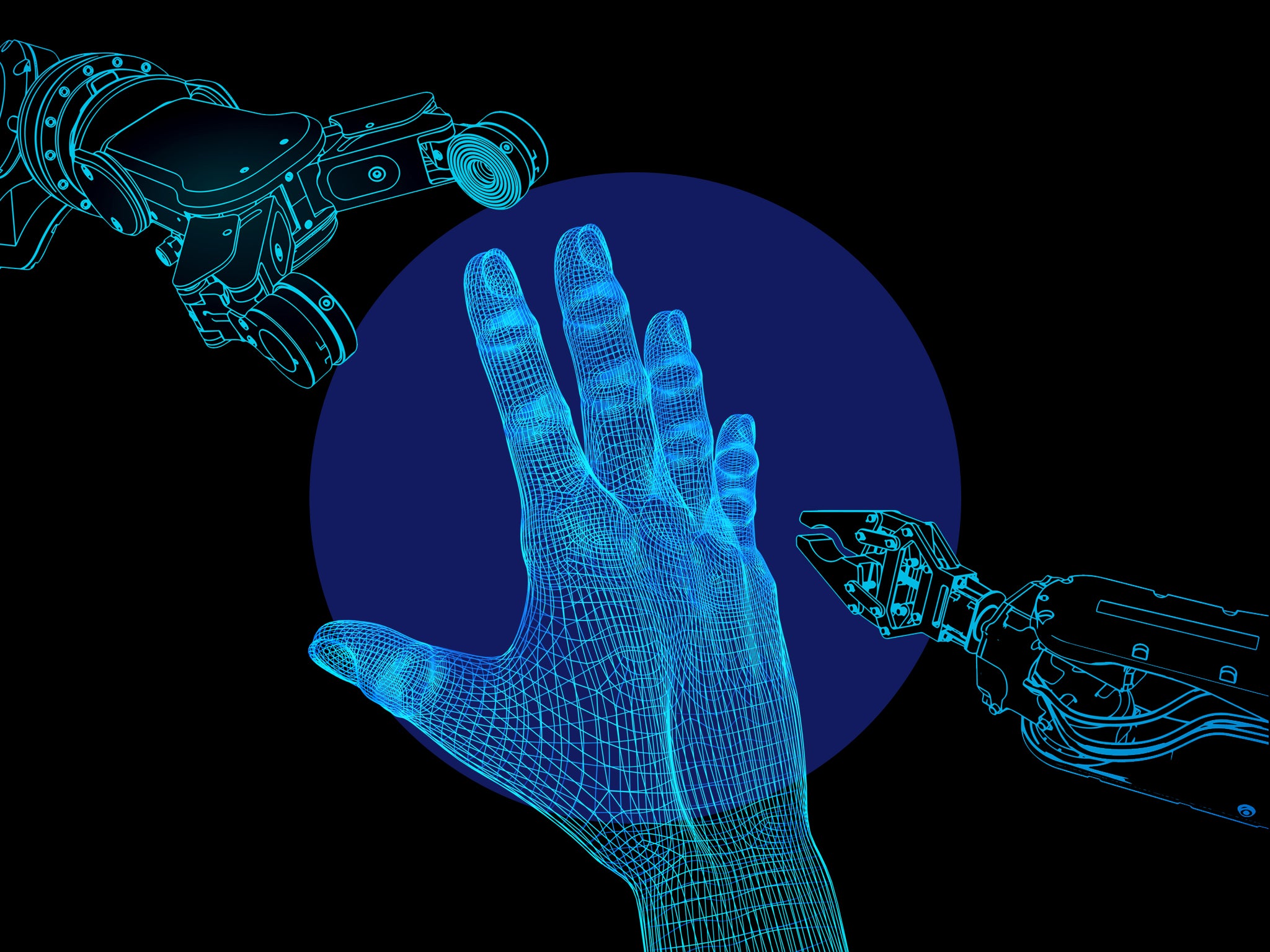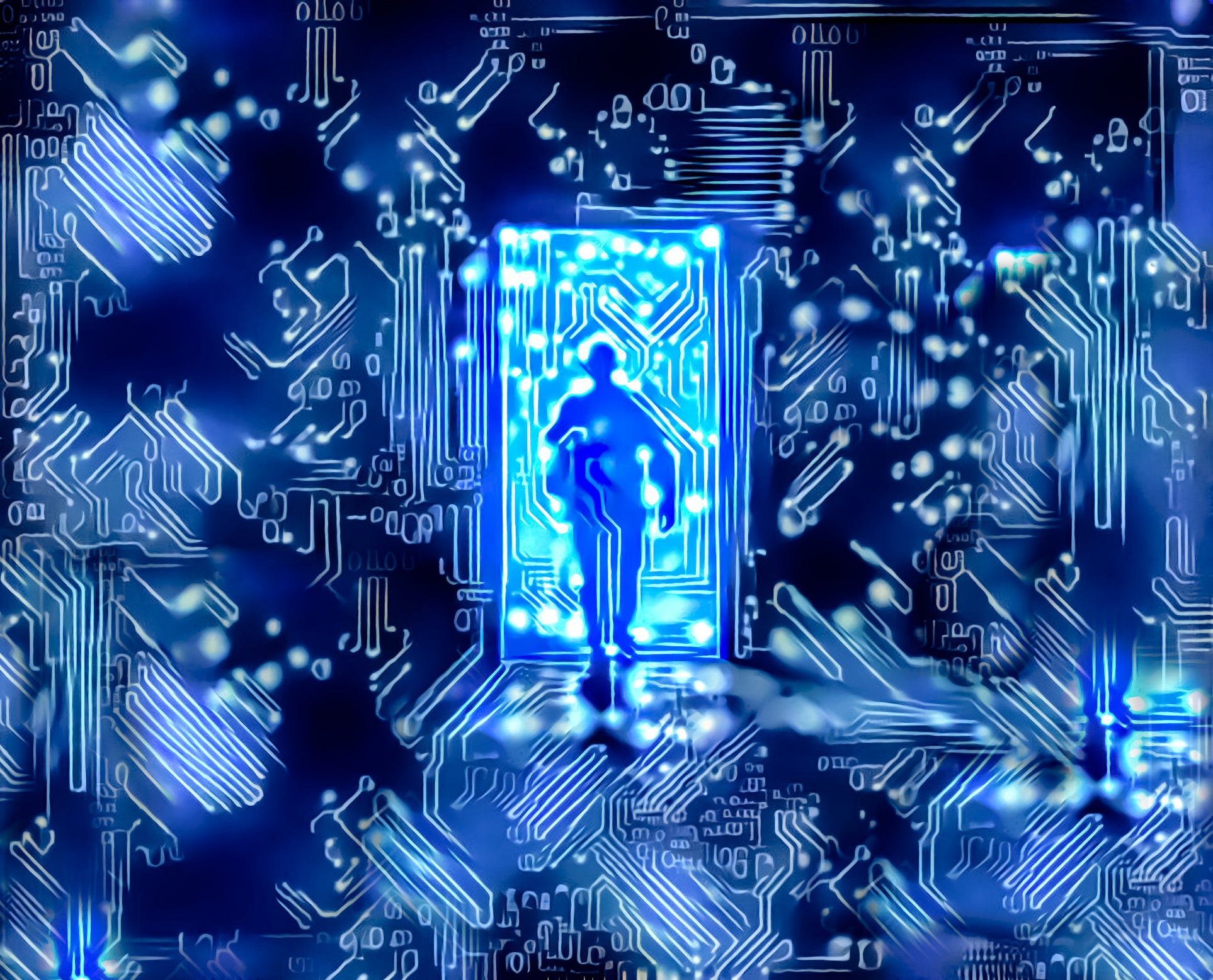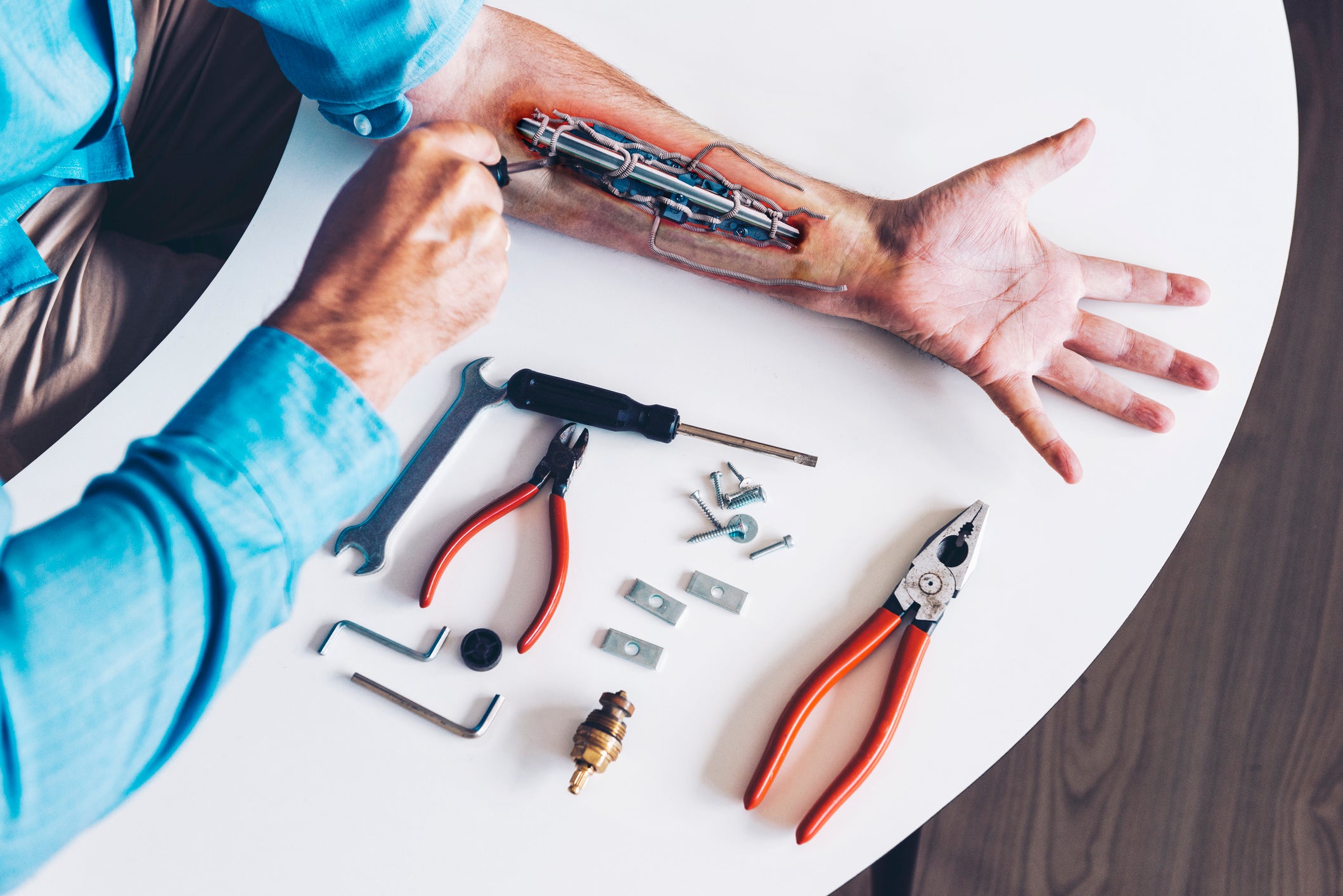Could biohacking be the answer to eternal life?
Most biohackers hope anti-ageing technology will be a means of delaying age-related diseases, but for transhumanists it’s a gateway to immortality, writes Sean T Smith


As a transhumanist James Miller believes that bio-transformative technologies may soon allow us to live forever. There’s only one problem: now that he’s in his mid-50s he’s afraid he might die just before this brave new world becomes possible.
That’s why Miller is determined to live long enough to achieve “longevity escape velocity” – the hypothetical point when life expectancy is improving annually at a faster rate than people are ageing.
“I’m old enough where I could easily die before this happens,” he tells me. “By extending my life just a little bit, I really could have a tremendous impact on my lifespan. The difference between 90 and 80 is enormous. If I can survive to that time I have the chance to survive for a very, very long time.”
Miller explains to me that our species is either on the cusp of armageddon or the inception of an artificial superintelligence so profound it could transform everything, everywhere forever. Miller is influenced by Ray Kurzweil an American computer scientist and futurist who believes that we are just a generation away from what transhumanists call “The Singularity” – the moment when computers learn to think for themselves.
At the moment artificial intelligence is characterised as “narrow” and still in its infancy: it can rival or outperform humans but only in specific domains like game playing, pattern recognition or sports analytics. Computer software that can defeat a chess grandmaster is so rigidly bound by its defining algorithms that it couldn’t even take on a child at drafts.
Until it can generalise across domains and effectively learn to think for itself, AI will not seriously rival human capabilities.

However, Kurzweil estimates that we are on schedule to develop a computer that has the same general intelligence level as a human being by 2030. He has been predicting technological advances with an 86 per cent accuracy rate since 1981 and now serves as Google’s director of engineering.
If Kurzweil is correct an AI entity on that level could, in theory, hold its own in conversation, analyse, imagine and plan just as we do. It could execute any task that a graduate could, but without the need to sleep, take a toilet break or pay off university debts.
By tasking it to read every bit of text on the internet, it would soon have access to all human knowledge. And, theoretically, there’s no reason why an AI with our level of general intelligence couldn’t be replicated and hived into a network of thousands of like-minded units.
By devoting just a fraction of its raw computational power to upgrading its own intelligence, such a machine learning network would have limitless potential. And, in theory, if the singularity occurs, the network of newly sentient computers could share their new thoughts directly.
From that point on, progress could be so exponential that our limited, linear minds would struggle to even comprehend what is happening.
According to the cognitive scientist Ben Goertzel, attempting to navigate a superintelligent world would put humans in about the same position as a cockroach trying to master macroeconomics. And at the current rate of progress, Kurzweil believes the singularity will occur in 2045.
Even hardened sceptics who regard transhumanism as an escapist fantasy cannot ignore the technology it’s founded on; no one is dismissing machine learning AI as science fiction whimsy
Through dystopian science fiction films like The Terminator, Hollywood has conditioned us to expect AI robot armies herding us to extinction.
On the other hand, a benevolent superintelligence programmed to look kindly on its human ancestor could just as easily help us out by curing every cancer, bio-printing replacement organs or by installing brain implants that allow us to communicate directly with AI.
So, in a post-singularity world, where everything is theoretically possible, it’s all to play for!
Now, you could be forgiven for thinking this all sounds like the most outlandish science fiction but as an economist specialising in the impact of near-future technologies, Miller is only outlining thinking that has moved from the cultish intellectual fringes to the mainstream.
The economic historian Yuval Noah Harari achieved global fame with his best seller Sapiens – his account of humanity’s journey from the east African plains around 70,000 years ago.
But in its sequel, Homo Deus Harari argued that we are among the last generations of homo sapiens before our species fuses with biotechnology and upgrades itself into a new lifeform.
Unfortunately, you’re unlikely to get superhumanity on the NHS.

Harari believes that biotechnological powers and longevity are likely to be the preserve of the masters of the data universe – the techno super-rich. He believes that transhumanism is already happening in Silicon Valley where tech titans have invested their billions in hacking humanity’s fundamental design fault: ageing. By teaming up with the Israeli entrepreneur and physicist, Yuri Milner, and investing in cellular rejuvenation research at Altos Labs, Jeff Bezos is just the latest addition to a crowded field where perhaps Peter Diamandis’ bet on young blood and stem cells is perhaps the most intriguing innovation.
As well as being a very big business estimated to be worth $4.9bn dollars in the United States alone, anti-ageing is also a flourishing cottage industry. Online communities of biohackers pour over the latest research and tweak their personalised cocktail of dietary and lifestyle hacks to slow the ageing process.
A scan of online forums suggests that most anti-ageing biohackers have modest goals. Biohackers in late-middle age are keen to experiment with low doses of unproven substances because they believe that they have little to lose.
They’re not looking for the elixir of youth, just a less frightening exit strategy by extending their “healthspan” and delaying the inevitable onset of age-related diseases.
But at the other end of the biohacking continuum, transhumanists like Miller believe that immortality is up for grabs.
“If I were still in my twenties I don’t think I’d be experimenting at all,” he says. “I’m doing it because my age puts me at increased risk of cancer and heart disease.”
Rapamycin is the longevity community’s greatest hope for a “quick win” in the war against human ageing because it has been shown to significantly extend lifespans in yeast, fruit flies and small mammals like mice and rats.
“I have been taking it for 20 weeks,” Miller tells me. “I think I’m taking a gamble but the odds are in my favour. I think it’s more likely to extend my life than reduce it. My regular doctor would not prescribe it to me but I found a longevity clinic that would.”

Although Rapamycin is a well-established drug that has been used to prevent organ rejection in transplant patients for decades it is not benign. As a potentially harmful immunosuppressant, doctors fear it can cause infections if doses are too high.
Low doses of rapamycin are believed to be safe and have even been shown to boost immunity in some cases. But Miller has been upping the dosage in recent weeks in the hope of more than marginal gains.
In addition to rapamycin, Miller also takes magnesium, vitamins and metformin. Metformin is a diabetes drug that regulates blood sugar. It has attracted the interest of the longevity community because an observational study appeared to show that diabetics taking the drug seemed to live longer than people without the disease – although this remains controversial and has been challenged.
Miller acknowledges that in 2022, the singularity still sounds way “out there”, but that’s precisely his point; by 2045 it might not be. “Evolution may not care about my 80-year-old self but I do,” he says.
In a post-singularity world of human augmentation, we would be in a position to direct our own evolution.
Even hardened sceptics who regard transhumanism as an escapist fantasy cannot ignore the technology it’s founded on; no one is dismissing machine learning AI as science fiction whimsy.
The consensus seems to be that it’s not a question of if machine learning will surpass human intelligence – but when.
Our bodies are such tiresome encumbrances, constantly craving nourishment and succumbing to the countless illnesses flesh is heir to that Kurzweil thinks we’d be better off without them
In an influential paper titled “When Will AI Exceed Human Performance? Evidence from AI Experts,” elite researchers in AI predicted that “human-level machine intelligence,” or HLMI, has a 50 per cent chance of occurring within 45 years and a 10 per cent chance of occurring within 9 years.
But surely we can at least dismiss the prospect of an AI genocide of the human race to the realms of science fiction? Well, not quite.
Ben Goertzel is a cognitive scientist and AI researcher who believes that although the probability of that happening is vanishingly small it can not be reduced to zero.
He points out that a quick review of human history suggests that most new technologies have been weaponised and shaped for military application by its earliest adopters.
And given that at the moment most infant AI is being developed for “selling, spying, killing and gambling”, Goertzel is concerned at the kind of superintelligence that might eventually emerge from such unprepossessing primordial soup.
At the moment infant AI is in the hands of vast corporations and American and Chinese government. China is projected to surpass the United States in AI investment by 2030.
And no lesser an authority than Vladimir Putin has predicted that “the one who becomes the leader in this sphere will be the ruler of the world”.
AI is potentially so transformative that even the MoD has been required to start thinking the unthinkable. If you want a truly surreal and disorientating experience have a read of “Human Augmentation – The Dawn of a New Paradigm” on the UK government’s website.
The eminent political scientist Francis Fukuyama regards transhumanism as “the most dangerous idea in the world.” But a transhumanist would argue merging with technology might be humanity’s best bet. Transhumanists love pointing to the archaeological record: there have been at least 21 separate species of human beings of which Homo sapiens are the last survivors. And 99.9 per cent of all species that have ever existed are now extinct.

Over at Google, Kurzweil argues that only by fusing with inorganic intelligence can we hope to escape the same fate. He advocates upgrading “our frail version 1.0 human bodies into their far more durable and capable version 2.0 counterparts.”
Our bodies are such tiresome encumbrances, constantly craving nourishment and succumbing to the countless illnesses flesh is heir to that Kurzweil thinks we’d be better off without them. For advocating having our consciousness digitised and uploaded to the cloud he has been called “a prophet of both techno-doom and techno-salvation.”
Future historians might one day come to regard Silicon Valley billionaires and their investment in anti-ageing biotech as an advance party of pioneers in the transhumanist revolution.
Although Miller describes himself as a “conservative biohacker” if the technology continues to advance and the research is sufficiently compelling, he wouldn’t hesitate to have one of Elon musk’s theoretical Neuralink chips implanted into his brain to communicate directly with a computer
Meanwhile, he intends to keep experimenting with “anti-ageing” drugs so that he can live long enough to live a lot longer. He compares it to investing in the stock market. “It’s a gamble but on average, over time, the risk pays off. But not putting your money in the stock market is also a gamble – if it pays off, you could have had some of that.”
In a form of metaphysical spread betting where the upside might just be infinite, it might become harder to bet against him.
“I’m confident that in 50 years’ time we will either have made massive scientific progress or destroyed civilisation,” he says. “Either way, I want to be around to see it.”
Join our commenting forum
Join thought-provoking conversations, follow other Independent readers and see their replies
Comments



Bookmark popover
Removed from bookmarks